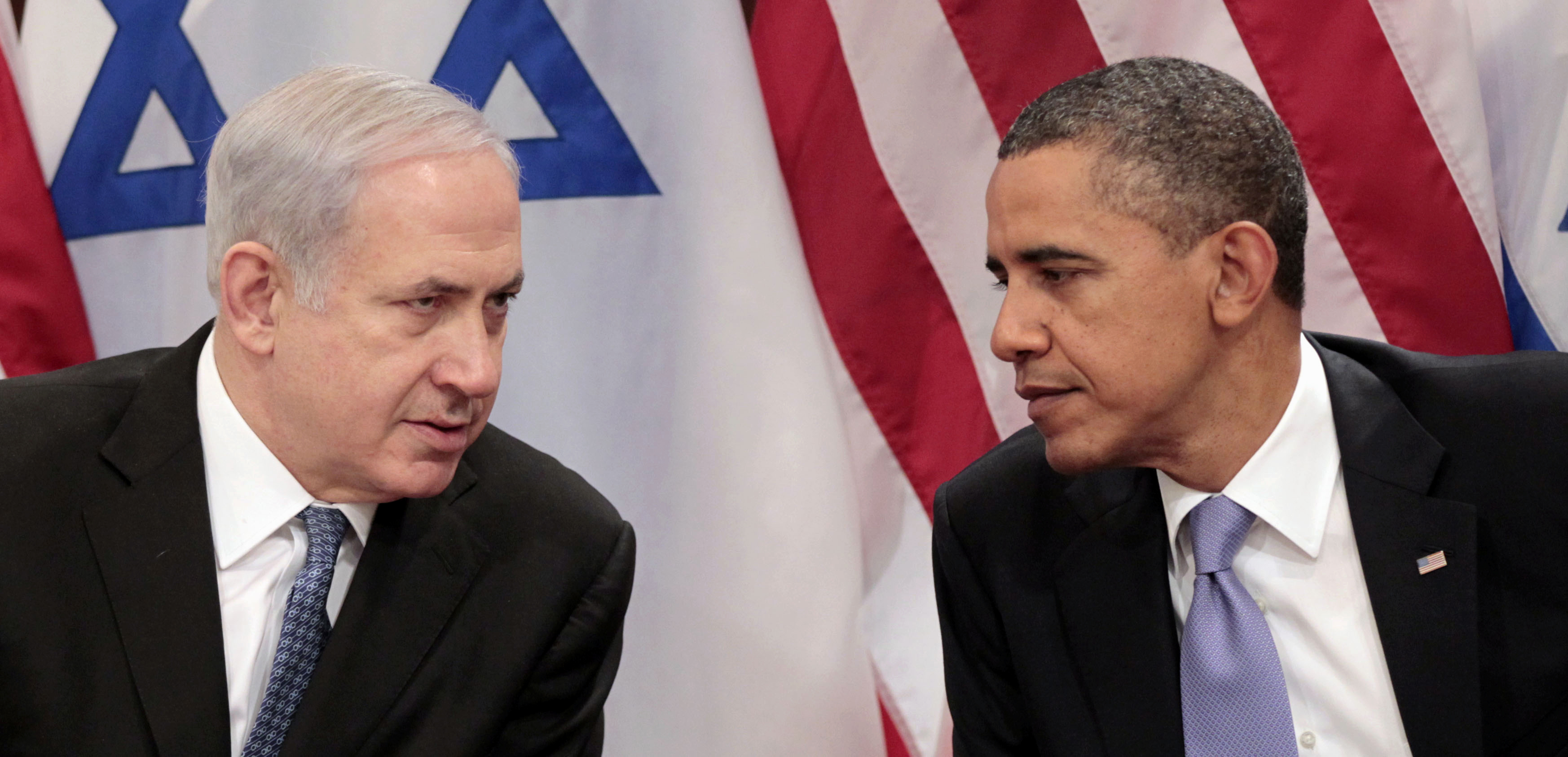Obama's pointless, delusional meeting with Netanyahu
President Obama will meet today for what's likely the last time with Israeli Prime Minister Benjamin Netanyahu, and I have one question: Why?


A free daily email with the biggest news stories of the day – and the best features from TheWeek.com
You are now subscribed
Your newsletter sign-up was successful
President Obama will meet today for what's likely the last time with Israeli Prime Minister Benjamin Netanyahu, and I have one question: Why?
I ask not because of the men's well-documented animosity; history is marked by leaders working together despite mutual loathing. I suppose there might be some loose ends on that recent $38 billion arms deal, but I imagine Obama and Netanyahu have people for that.
No, what I can't imagine is what the president hopes to achieve. There's speculation he's going to "push" Israel on peace with the Palestinians, but after eight years of watching Israel build settlements, move progressively rightward, and never miss an opportunity to thumb its nose at Obama and stated U.S. foreign policy, what's led the president to believe that this is the week Netanyahu will be swayed? Obama had his chance. He blew it.
The Week
Escape your echo chamber. Get the facts behind the news, plus analysis from multiple perspectives.

Sign up for The Week's Free Newsletters
From our morning news briefing to a weekly Good News Newsletter, get the best of The Week delivered directly to your inbox.
From our morning news briefing to a weekly Good News Newsletter, get the best of The Week delivered directly to your inbox.
It could be argued Obama has had eight years of chances, but that's not entirely accurate. There was certainly a chance to be grabbed early on. The first calls Obama made from the Oval Office (three days after Israel halted a military offensive in the Gaza Strip in which 1,300 Palestinians were killed) were to Palestinian President Mahmoud Abbas, Netanyahu, and the leaders of Egypt and Jordan — and on his second day in office, Obama appointed veteran diplomat George Mitchell (previously chair of peace negotiations in Northern Ireland) as special envoy for Middle East peace.
Less than four months later, Obama travelled to Cairo and delivered a stirring speech in which he said "the situation for the Palestinian people is intolerable… America will not turn our backs on the legitimate Palestinian aspiration for dignity, opportunity, and a state of their own." Before his first year was out, Obama had pressured Netanyahu sufficiently that the latter agreed, with an enormous display of reluctance, to freeze West Bank settlement construction for 10 months.
This was billed as an act of good faith to reanimate long-moribund peace talks — but accepting it as such required a kind of willful obtuseness. Consider that the Israeli government had already committed to freezing all settlement activity in 2003, and kept building anyway. The 2010 agreement covered only new construction, allowing work to continue wherever concrete had been poured — which led to a rush to pour concrete before the freeze took effect, allowing an enormous amount of construction to carry merrily along, and then speed up when the "freeze" ended.
In 2011, Obama explicitly stated that peace would require Israel to withdraw to its pre-1967 borders; the speech in which he said this coincided with George Mitchell's resignation as special envoy. For while the man who'd facilitated peace in Belfast officially had the president's ear, Obama had come to depend increasingly on Dennis Ross, also a veteran diplomat, but one with a long history of coddling the Israeli government and failing to achieve peace.
A free daily email with the biggest news stories of the day – and the best features from TheWeek.com
The ensuing years saw another election and another Israeli offensive in Gaza; in 2013, Obama got what was arguably his last chance to facilitate Israeli-Palestinian rapprochement when Secretary of State John Kerry launched nine months of shuttle diplomacy. Intended to achieve a framework agreement, Kerry's efforts ultimately became about just keeping Israelis and Palestinians at the table — and even that failed.
In the meantime, Israel launched a third, massive offensive in Gaza (more than 2,200 Palestinians killed; whole city blocks reduced to rubble), the past year has seen a precipitous rise in Palestinian attacks on Israelis (32 killed in the last 12 months, alongside 230 Palestinians killed by Israelis), and the U.S. has condemned this or taken issue with that, but for the most part, kept its distance. Israeli data indicate that the last eight years of settlement construction — read: the entrenchment of the occupation that Obama opposes — has matched, or exceeded, construction during the George W. Bush administration.
Many things stand in the way of a durable Israeli-Palestinian peace, not least Palestinian terrorism; domestic politics on both sides; a mutual refusal to recognize the just demands of long-time enemies; the hugely fraught questions of how to share Jerusalem and the status of Palestinian refugees; and all those wars in Gaza, each of which was part of a cyclical and very lopsided war of attrition waged between the sides for decades.
But even if all that were somehow, through sheer force of will, resolved, Obama's stated goal of a two-state peace literally cannot be achieved if Israel not only refuses to leave Palestinian land but continues to build on it. Which is, and has always been, the goal of settlement — to force permanent Israeli control over the West Bank.
What could the Obama administration have done to convince its client state that compromise for the sake of peace was in its own best interests? Any number of things, ranging from the geopolitical to the financial. We'll never know if putting real pressure on Israel would have worked, because Obama — like every other president before him, with the single and short-lived example of George H.W. Bush — was never willing to push Israel past its comfort zone. I believe Obama to have been an excellent president for the American people, but the simple truth is that he has failed Israelis and Palestinians miserably.
Netanyahu, on the other hand, has staked his entire career on settlement and was once secretly recorded telling a group of constituents: "I know what America is. America is a thing you can move very easily… They won't get in our way."
Do you think Obama wants a chance to tell Netanyahu he was right?
Emily L. Hauser is a long-time commentary writer. Her work has appeared in a variety of outlets, including The Daily Beast, Haaretz, The Forward, Chicago Tribune, and The Dallas Morning News, where she has looked at a wide range of topics, from helmet laws to forgetfulness to the Israeli-Palestinian conflict.
-
 The Olympic timekeepers keeping the Games on track
The Olympic timekeepers keeping the Games on trackUnder the Radar Swiss watchmaking giant Omega has been at the finish line of every Olympic Games for nearly 100 years
-
 Will increasing tensions with Iran boil over into war?
Will increasing tensions with Iran boil over into war?Today’s Big Question President Donald Trump has recently been threatening the country
-
 Corruption: The spy sheikh and the president
Corruption: The spy sheikh and the presidentFeature Trump is at the center of another scandal
-
 The billionaires’ wealth tax: a catastrophe for California?
The billionaires’ wealth tax: a catastrophe for California?Talking Point Peter Thiel and Larry Page preparing to change state residency
-
 Bari Weiss’ ‘60 Minutes’ scandal is about more than one report
Bari Weiss’ ‘60 Minutes’ scandal is about more than one reportIN THE SPOTLIGHT By blocking an approved segment on a controversial prison holding US deportees in El Salvador, the editor-in-chief of CBS News has become the main story
-
 Has Zohran Mamdani shown the Democrats how to win again?
Has Zohran Mamdani shown the Democrats how to win again?Today’s Big Question New York City mayoral election touted as victory for left-wing populists but moderate centrist wins elsewhere present more complex path for Democratic Party
-
 Millions turn out for anti-Trump ‘No Kings’ rallies
Millions turn out for anti-Trump ‘No Kings’ ralliesSpeed Read An estimated 7 million people participated, 2 million more than at the first ‘No Kings’ protest in June
-
 Ghislaine Maxwell: angling for a Trump pardon
Ghislaine Maxwell: angling for a Trump pardonTalking Point Convicted sex trafficker's testimony could shed new light on president's links to Jeffrey Epstein
-
 The last words and final moments of 40 presidents
The last words and final moments of 40 presidentsThe Explainer Some are eloquent quotes worthy of the holders of the highest office in the nation, and others... aren't
-
 The JFK files: the truth at last?
The JFK files: the truth at last?In The Spotlight More than 64,000 previously classified documents relating the 1963 assassination of John F. Kennedy have been released by the Trump administration
-
 'Seriously, not literally': how should the world take Donald Trump?
'Seriously, not literally': how should the world take Donald Trump?Today's big question White House rhetoric and reality look likely to become increasingly blurred
